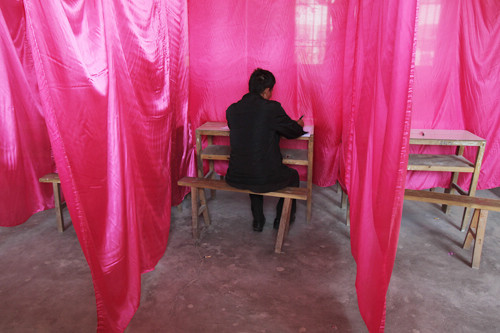|
 |
|
WINNING DEMOCRACY: A villager fills in the ballot to vote for a new villagers' committee in Wukan Village in south China's Guangdong Province on February 1 (CFP) |
On February 11, a vote was held in Wukan, a fishing village in south China's Guangdong Province. Wukan attracted worldwide attention last year following a series of demonstrations. Starting in September 2011 complaints about land use, financing and the village election escalated into violent demonstrations by Wukan villagers. One of the main demands of the protestors was for fresh elections to be held in order to replace corrupt village officials.
The elections, presided over by an 11-member election committee chosen by villagers through polling on February 1, were held to select a team of 107 village representatives and seven villagers' group leaders.
According to local election procedures, those who applied for group leader positions were required to secure supporting signatures from at least 100 voters, while village representative candidates were required to get at least 50 signatures.
"This is to make sure the candidates are well-grounded and trusted by villagers, and to ensure fairness in the upcoming village committee election," said Yang Semao, director of the election committee.
Of the 12,000 residents of Wukan, 8,222 are over 18 and eligible to vote. Of those, 7,923 registered to vote and 6,466 secret ballots were cast to elect villagers' group leaders and 6,475 were cast to elect village representatives, representing a turnout of more than 80 percent, according to Xinhua News Agency.
The election results were announced late on February 11. Following the counting, the number of village representatives was increased to 109, as some candidates received an equal number of votes.
However, the poll failed to elect villagers' group leaders, as all the candidates standing received less than 50 percent of the votes from each group administered by the village. Local officials said that the leaders would be elected in future elections in line with stipulated procedures.
"Everything is heading in the right direction in Wukan," said Lin Zuluan, a protest leader who now serves as secretary of the Wukan Village Committee of the Communist Party of China (CPC). "A vote for the new villagers' committee, has also been scheduled. It will take place on March 1."
In accordance with China's Constitution and the Organic Law on Villagers' Committees, such committees are established to facilitate self-governance by villagers.
In September and November, villagers in Wukan, which is administered by Lufeng City, repeatedly staged protests against village authorities over illegal land sales and other issues.
The villagers gathered again on December 11, 2011 after Xue Jinbo, a man who was suspected of organizing the November demonstrations, died during police custody. Local police sealed off roads to the village to isolate the protestors.
The standoff between villagers and the local government was not defused until December 22 last year when Zhu Mingguo, Vice Secretary of the Guangdong Provincial Committee of the Communist Party of China, held direct talks with villagers and promised a fair and open investigation.
Zhu admitted that the protesting villagers' main requests were reasonable and "some mistakes" had been made by local officials.
On December 19, 2011, a special work group organized by the Guangdong Provincial Government began to look into the villagers' complaints. Results of initial investigations were released at the end of the month, indicating that some village officials had violated the law and ethics of office by selling farmland in Wukan for commercial use.
"The issue of land use, including collecting land from villagers and sales to developers, has not been publicly and fairly disclosed to residents in Wukan since the 1990s," said Yang Junbo, Deputy Director of the Guangdong Provincial Department of Land and Resources, who was in charge of investigating the land issue under the provincial work group.
Beginning in 1993, the former Wukan Villagers' Committee sold more than 42 hectares of farmland for commercial use. Only 3.6 hectares of this land was approved or officially registered for use by local authorities, the preliminary investigation showed.
| 